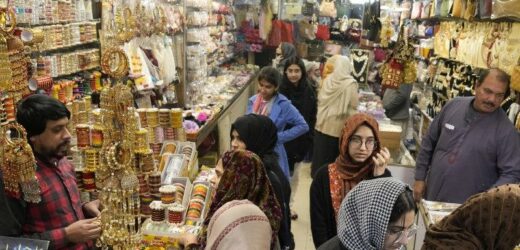Peshawar/Lahore: Markets in major Pakistani cities have spurned a new government directive to shut early under an energy conservation drive, in a blow to the cash-strapped country’s plans to curtail energy imports amidst an economic crisis.
The government a day earlier ordered all malls markets and restaurants to close by 8.30pm to save fuel, whose imports have drained the country’s foreign reserves leaving them at a level that barely covers a month’s worth of imported goods.
People visit a market in Lahore, Pakistan, where shopping for basic daily needs is largely done at night.Credit:AP
In the nation’s largest cities of Lahore, Karachi and Peshawar, almost all major markets and shopping centres remained open beyond the cut-off time on Wednesday.
“We outright reject this plan,” Mohammad Ishaq, president of the Sarhad Chamber of Commerce and Industry, a traders’ association in the north-western city of Peshawar, said adding that businesses that already faced security issues and energy shortages, would resist attempts to enforce it.
“This policy will kill me and my business, which starts after 8pm when children come to my shop with their parents,” Muhammad Raza, a toy shop owner in the eastern city of Lahore, said.
Markets in major cities traditionally remain open late into the night, in most cases up to 11pm, as shoppers usually get out in the evenings.
A shopping mall in Peshawar, Pakistan, on Wednesday. Authorities have ordered shopping malls and markets to close by 8:30pm,about three hours earlier than usual.Credit:AP
In Karachi, the country’s commercial hub, president of the Pakistan Traders Association, Mohammad Ajmal Baloch, said local traders were reluctant to cut business hours short.
Defence Minister Khawaja Asif said the measures to shut markets, including restaurants, aimed to save the cash-strapped country about 62 billion Pakistani rupees ($402 million). He said the energy conservation plan also included banning the production of energy inefficient bulbs and fans from February and July respectively.
Businesses fear the curbs will further slow the economy, already weighed down by the aftermath of historic floods in August 2022, soaring energy costs and central bank rate hikes to tame decades-high inflation.
The central bank has halved its growth projections to 2 per cent for the 2023 financial year.
The government has struggled to quell default fears in domestic and international markets, with a $US1.1 billion ($1.6 billion) International Monetary Fund bailout tranche that should have been completed in November awaiting approval.
Other critical multilateral and bilateral financing avenues are also linked to the IMF program, which means the South Asian nation of 220 million people is hard-pressed to meet external financing needs of over $US30 billion until June 2023, including debt repayments and energy imports.
Reuters
Most Viewed in World
From our partners
Source: Read Full Article




